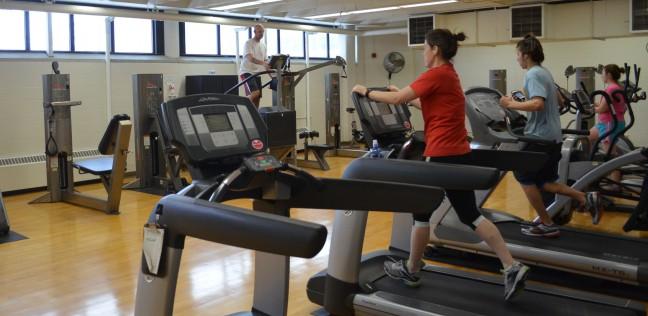Families and their children with intellectual and developmental disabilities often face many barriers to getting accessibility to exercise. But, in 2019, University of Wisconsin associate professor of Kinesiology Luis Columna brought the Fit Families program to Madison — a program that adapts exercise to individual kids and encourages parents to be involved in their child’s physical health.
Columna said he became inspired to found the Fit Families program by accident when he observed parents stepping up to assist their children with visual impairments at a sports camp in Guatemala.
“At the end … I interviewed a parent,” Columna said. “One told me, ‘I’ve read a lot about physical activity, I know it’s important, but it’s not the same reading about it versus doing it.’ And I said, ‘You just gave me a phenomenal idea.’”
Often, the biggest obstacle isn’t the activities themselves but the mindset of the parents, who can be overprotective of their children — which can unconsciously hold them back from the confidence they need to have fun, Columna said.
Perceptions of personal expertise have a huge impact on the limits of what a child can do and when parents are afraid for their children, their mindset tends to rub off on them. Fit Families teaches parents to give their kids the confidence to set their own intentions.
“[If] you have the intention to do something, most likely you’re going to do it,” Columna said. “If you want to do physical activity, you have the intention, you will do it.”
Women face barriers in computational sciences, but experts say change is possible
Parents of children with intellectual or developmental disabilities also need support in helping arrange their children’s physical activity. For example, while some parents can tell their children to run around in the backyard, other children may need more direction — their parents don’t always know how to give them the tools they need, Columna said.
According to Columna, physical education classes today are missing communication. Physical education teachers must reach out to parents, just as they would if a student were struggling in math or English and share resources about the activities they’ll be doing in class. This would give parents the opportunity to break down activities for their kids at home, making gym class a less daunting place for all students, particularly those with disabilities, Columna said.
Engaging kids in physical activities is important — being healthy, having intentions for their health and confidence in one’s abilities are what allows people to enjoy life, Columna said.
He hopes to expand Fit Family offerings to include classes for adults. Engaging in physical activities such as strength training and yoga could help parents destress and provide an environment that shows children that being active is normal, Columna said. As a parent himself, Columna emphasized the importance of being a role model for his own sons.
“They see how we [parents] eat, that we are physically active, and they will imitate,” Columna said.
The bottom line is that having a healthy body sets kids up for having a healthy life, Columna said. According to Columna, physical education is just as important as other subjects and should be mandatory for all children — those with disabilities and those without.
According to Columna, when students are physically active, their grades are higher, behavioral issues are reduced and they have a more positive learning mindset.
It isn’t only kids and their parents who benefit from physical activities, Columna said. He now aims to bring the program to adults with Down syndrome.
People with Down syndrome are very likely to develop Alzheimer’s disease, Columna said, but exercise could be one way to slow the progression of neurodegenerative diseases. With his colleague and UW professor of human development and family studies Sigan Hartley of the Waisman Center, Columna is currently developing a program for adults with Down syndrome focusing on strength training.
Rather than with kids, where the goal is to teach them fundamental motor skills like kicking and throwing, adults need a physical activity that prepares them for everyday physical tasks like walking to the grocery store, Columna said.
November highlights UW’s commitment to diabetes awareness, research always ongoing
UW graduate student Heather Katz is working to make inclusive exercise for adults by designing an effective, evidence-based group exercise intervention that will prepare people with intellectual or developmental disabilities for work and independent life after high school.
The first stage of her exploratory study involved interviewing group exercise instructors from across the U.S. about their perceptions of people with intellectual and developmental disabilities, how prepared they feel to teach them and what they would need to implement group exercising programming, Katz said.
“I wasn’t surprised with a lot of the things I found,” Katz said. “They just haven’t been exposed to people with disabilities before. It’s common … People with disabilities face a lot of barriers to being active in society.”
Sometimes adults with intellectual or developmental disabilities are not able to get to a gym and may rely on other people to drive them, Katz said. Often, gyms themselves are not adapted to the needs of people with developmental disabilities — they might play loud music or have large classes with overwhelming numbers of people.
Just as many buildings today are outfitted with ramps, gyms can begin to incorporate accessible resources such as headphones to block out unwanted noise or classes with intentionally softer music or smaller groups of people, Katz said. Gyms could also offer classes where movement is broken down and taught more slowly, so people can grow a sense of confidence rather than being launched into a fast-paced class.
UW professors awarded grant for life sciences communication research
“I would love to see a standard curriculum that exercise instructors can go to,” Katz said.
Another route that interests her is people with disabilities serving in roles as group fitness instructors, Katz said. She already sees a few instructors with intellectual or developmental disabilities, including Zumba instructors with Down syndrome and thinks there’s room for more. At UW, there are multiple programs designed to support affected groups, but it isn’t widespread enough to change the world, Katz said.
There’s a mountain of change to be climbed and Katz said it cannot be overcome all at once. Through interviewing group exercise instructors, she noticed a desire for change — people want to be more inclusive, but they just don’t know how to do it, Katz said.
Researchers have to incorporate the community members into their research and understand their audience as a whole in order to meaningfully change lives, Katz said.
“I think it’s really important in every step of the research process that we’re keeping the target audience or the affected group in mind and being creative on how to include them,” Katz said. “Getting out there and getting to know your community or participants and doing something that helps them, I feel that kind of stuff is important.”














